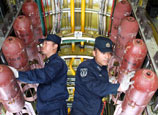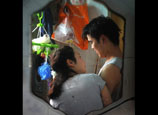
The government has focused on helping small businesses in its latest moves to stimulate growth, which is being impeded by a slowdown in exports.
Economists said that the incentives for struggling exporters, such as fee cuts and tax exemptions announced earlier this week, are designed to provide small businesses with a badly needed liquidity lifeline.
Although the measures are being welcomed by business leaders, some of them are calling on the government to take even bolder steps to reinvigorate the manufacturing and export sector.
The State Council said on Wednesday that it would simplify customs clearance procedures, cut administrative fees and provide zero tariffs for exporters in the service sector.
Analysts said that the moves are of particular significance at a time when the most widely watched indicators show a worsening export outlook.
The purchasing managers' index of business conditions fell to 47.7 in July from June's final reading of 48.2, according to HSBC Bank Plc's index, in which smaller companies carry a heavy weight.
The trade stimulus plans are pro-growth methods to alleviate burdens for small businesses, enabling them to keep more cash on hand and speed up export procedures, economists agreed. "For instance, the waiver of export product examinations will save companies time and money spent on renting warehouses," said Zhao Pei'en, a certified public accountant in Shanghai.
The administrative fee waiver is a "substantial bonus" for a wide range of industries, he added.
Gao Qiang, general manager of Shanghai SVS Tools Co Ltd, called the moves a "fine-tuning", representing government efforts to improve liquidity among cash-strapped firms.
"Thanks to the policy, our company may save up to 1.5 million yuan ($244,383) per year. It's not necessarily a bulky amount, but we do appreciate it," said Gao, whose firm recorded 50 million yuan in revenue in 2012.
"The administrative cost for exports, which only equals 0.15 percent of the value of items, will hardly exert any genuine influence on us, but the waiver does save us some time and labor expenses," said Guo Xuefei, the financial officer of Wenzhou Longde Shoes Co Ltd.
To ease the financial crunch, Guo said a way to help small companies would be to increase the export rebate rate, a tool that the government has applied to shore up key export sectors.
In a further push to help companies, the government will also temporarily suspend business and value-added taxes for more than 6 million small companies.
The decision is largely a "symbolic" government-led endeavor to enrich small-scale businesses and prevent renewed fears of a Chinese hard landing, said Dai Jie, head of the international cooperation office of the Shanghai Small Enterprises Center.
"The message being sent here is a strong will to defend a stable growth rate and prevent employment from slipping too far," he said.
For instance, Shanghai is home to more than 340,000 micro and small enterprises, which account for a dominant share, or 96.7 percent, of all types of companies in the city. They provide 54.6 percent of the city's jobs, according to government figures.
But Dai urged the revenue threshold to be lifted so that more companies are eligible for the tax breaks.
"The current level for tax exemption comes at too low a scale, as very few micro and small enterprises record monthly sales revenue of less than 20,000 yuan," said Liu Mengjue, manager of Wenzhou Jinyi Clothes, which has 40 employees. It exports mostly to the US and Europe.
Under the strict policy, even "mom-and-pop" stores can hardly qualify, said Zhao.
"I'm not sure whether the tax deduction measures will benefit us directly, as taxes for different products exported to different regions all vary. It has yet to be explained in detail in the government directive," said Jiang Kexing, manager of Zhejiang Hongxu Trading Co Ltd in Yiwu, Zhejiang province.
Fan Yun, chairperson of Shanghai Fushen State Assets Evaluation Co Ltd, said profits for Shanghai-based industrial MSEs in 2012 slid by 19.9 percent year-on-year, while taxes paid by corporates grew by 7 percent.
















 Migrant children’s dream of stage
Migrant children’s dream of stage


![]()
